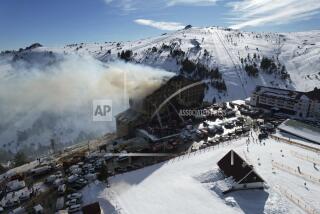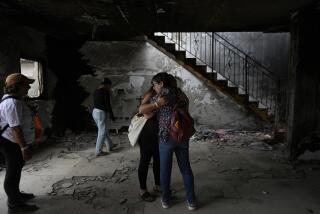Attacks Continue as Invasion Anniversary Nears
- Share via
BAGHDAD — A series of car bombings, mortar attacks and assassinations left nine people dead across Iraq on Thursday, and military officials braced for further attacks in the run-up to Saturday’s one-year anniversary of the U.S.-led invasion of Iraq.
Authorities said the milestone was an added cause for vigilance although they couldn’t tell whether a rash of strikes this week had been coordinated.
“The best and only way to prepare for that is to be on the offensive,” said Brig. Gen. Martin Dempsey, commander of the Army’s 1st Armored Division in Baghdad. “You can’t sit back and wait for terrorists to pick the point of his choosing to attack you.”
Thursday’s toll consisted of four Iraqis killed in an explosion near a hotel in the southern city of Basra; three Iraqi employees of a U.S.-funded television station shot dead on a highway northeast of Baghdad near Baqubah; and two Iraqi civilians, including a child, killed and 17 American troops injured in a mortar attack on the fortified City Hall in Fallouja, west of the capital.
Late in the day, rockets struck two hotels used by foreign contractors near the Green Zone, the secured area in central Baghdad where the U.S.-led occupation authority was based. There were no reports of serious injuries.
The spate of attacks came after Wednesday night’s massive bombing at the Mount Lebanon Hotel in downtown Baghdad that destroyed the five-story structure and nearby houses, leaving a deep crater.
In a sign of the chaos that sometimes follows major attacks, the U.S. military downgraded Wednesday’s death toll to seven from 27, blaming the change on early confusion. Military officials said a British national staying at the hotel was among the dead, and area residents said several others were killed in a house inhabited by a Christian family across the street.
Friends and neighbors of the victims gathered Thursday at the site of the explosion, which U.S. officials said was caused by a car bomb, to begin the painful job of rebuilding shattered lives, homes and businesses.
In what had been the lobby of the Mount Lebanon Hotel, blood stained the walls near a debris-dusted table still set for dinner.
Some U.S. military officials said the narrow street of hotels, shops and homes in the Karada neighborhood might not have been the intended target.
They speculated that the bomb-laden car exploded prematurely while en route to another location such as the World Health Organization offices a block away.
Others were less sure. “They do reconnaissance before these operations,” Dempsey said. “The idea of their getting lost is a little hard to swallow.”
As a crowd milled in front of the charred hotel, combing through the wreckage, a U.S. military psychological operations officer handed out leaflets that called on Baghdad residents to turn in insurgents in order to forge a new Iraq.
“Your future is the light of the sun, which will disperse terrorists as it dispersed the beetles hiding in the dark,” read one of the Arabic-language fliers.
His efforts seemed to take a back seat to rumors that surged through the crowd.
Well-dressed men and others in tattered clothes offered a range of views on the attacker’s motives and methods. But the crowd seemed to be in near-total agreement on one point: that the U.S. was at fault.
“It’s 100% sure the Americans arranged this attack,” said Safa Hussein Ali, 24, a tire repairman, standing at the entrance to his badly damaged house. “They’re using very sophisticated computers to carry this out because they want to create more disturbances and stay longer.”
Abdulsatter Abadi, 42, said his 13 years of experience as a soldier in Saddam Hussein’s army qualified him to correctly determine the attack’s origin. “I know the sound,” he said. “It was a rocket fired by a jet fighter, and only Americans have jet fighters. They want to stay longer to plunder Iraq’s riches.”
Other bystanders said that the Iraqi Governing Council and Iraqi police were part of an American plot. And some claimed that American contractors had been warned to vacate the hotels before the attack or that U.S. soldiers carted off the evidence of rockets.
A few hundred yards away, Sgt. Martin Morales of the 345th Psychological Operations unit attracted an animated crowd that peppered him with heated questions as he handed out fliers offering a $10-million reward for the capture of Abu Musab Zarqawi, whom U.S. officials have accused of masterminding numerous bombings in Iraq in the last year.
“The emotions here are high, which is understandable. And they have a right to express it,” said Morales, a reserve officer and U.S. marshal from Dallas. “They have great questions. I wish I had good answers.”
Morales added that U.S. outreach efforts, including medical, education and dairy programs, have been well received.
Elsewhere in the city, soldiers in a pair of Humvees handed out copies of the coalition newspaper Baghdad Now, another hearts-and-minds effort. “These American radio programs, newspapers and leaflets have no impact on our society,” said Abu Ali, a furniture store owner, as he glanced at Baghdad Now.
Managers at smaller hotels dotting Baghdad’s back streets said they feel increasingly vulnerable as insurgents strike at more “soft” targets, particularly those where foreigners work or reside. Most of the facilities lack the concrete barriers and guards of their larger counterparts.
In response, some said Thursday that they planned to block off streets and set up barricades while others said they would turn away foreign guests.
“There’s not enough concrete in this hemisphere to protect every hotel in Baghdad,” Dempsey said.
Officials at the Andalus Palace a few blocks from the Mount Lebanon said they hoped to put up roadblocks out front. At the nearby Aghadeer Hotel, officials said they had stepped up searches. The Al Majalis, meanwhile, was no longer accepting foreigners, even from Arab nations.
“We’re famous for our hospitality, and it’s very sad to turn people away,” said the owner, who would identify himself only as Waleed, citing safety concerns. “We hope we’ll have security back soon and be able to receive everyone.”
More to Read
Sign up for Essential California
The most important California stories and recommendations in your inbox every morning.
You may occasionally receive promotional content from the Los Angeles Times.











